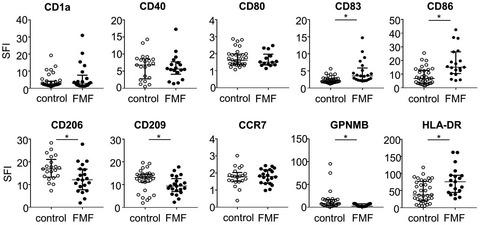当前位置:
X-MOL 学术
›
Clin. Exp. Immunol.
›
论文详情
Our official English website, www.x-mol.net, welcomes your
feedback! (Note: you will need to create a separate account there.)
Monocyte-derived dendritic cells display a highly activated phenotype and altered function in patients with familial Mediterranean fever.
Clinical & Experimental Immunology ( IF 3.4 ) Pub Date : 2020-04-11 , DOI: 10.1111/cei.13439 T Funk 1 , A R Fuchs 1 , V S Altdörfer 1 , R Klein 1 , S E Autenrieth 1 , M R Müller 1 , H R Salih 1, 2 , J Henes 1 , F Grünebach 1 , D Dörfel 1, 2
Clinical & Experimental Immunology ( IF 3.4 ) Pub Date : 2020-04-11 , DOI: 10.1111/cei.13439 T Funk 1 , A R Fuchs 1 , V S Altdörfer 1 , R Klein 1 , S E Autenrieth 1 , M R Müller 1 , H R Salih 1, 2 , J Henes 1 , F Grünebach 1 , D Dörfel 1, 2
Affiliation

|
Dendritic cells (DCs) are sentinels of the immune system that bridge innate and adaptive immunity. By capturing antigens in peripheral tissue, processing and presenting them with concurrent expression of co‐stimulatory molecules and cytokine secretion they control and modulate immune reactions. Through pattern recognition receptors, DCs sense molecules that are associated with infection or tissue damage, frequently resulting in the formation of inflammasomes upon intracellular stimulation. The inherited autoinflammatory familial Mediterranean fever (FMF) is associated with deregulated activity of the pyrin inflammasome leading to acute inflammatory episodes. However, differentiation and function of DCs in this disease are as yet unclear. Therefore, we first determined DC subpopulation frequency in peripheral blood of a cohort of FMF patients. Joint evaluation without classification according to specific patient characteristics, such as mutational status, did not disclose significant differences compared to healthy controls. For the further examination of phenotype and function, we used immature and mature monocyte‐derived DCs (imMo‐DCs, mMo‐DCs) that were generated in vitro from FMF patients. Immunophenotypical analysis of imMo‐DCs revealed a significantly elevated expression of CD83, CD86 and human leukocyte antigen D‐related (HLA‐DR) as well as a significant down‐regulation of CD206, CD209 and glycoprotein NMB (GPNMB) in our FMF patient group. Furthermore, FMF imMo‐DCs presented a significantly higher capacity to migrate and to stimulate the proliferation of unmatched allogeneic T cells. Finally, the transition towards a more mature, and therefore activated, phenotype was additionally reinforced by the fact that peripheral blood DC populations in FMF patients exhibited significantly increased expression of the co‐stimulatory molecule CD86.
中文翻译:

单核细胞衍生的树突状细胞在家族性地中海热患者中表现出高度活化的表型和功能改变。
树突状细胞(DC)是桥接先天免疫和适应性免疫的免疫系统前哨。通过捕获周围组织中的抗原,加工并同时表达共刺激分子和细胞因子分泌,它们可以控制和调节免疫反应。通过模式识别受体,DC感知与感染或组织损伤相关的分子,通常在细胞内刺激后导致炎性体的形成。遗传性自身炎症性家族性地中海热(FMF)与吡喃炎症小体活性失调有关,导致急性炎症发作。然而,DC在该疾病中的分化和功能尚不清楚。因此,我们首先确定了一群FMF患者外周血中的DC亚群频率。没有根据特定患者特征(例如突变状态)进行分类的联合评估与健康对照组相比没有发现显着差异。为了进一步检查表型和功能,我们使用了生成的未成熟和成熟的单核细胞来源的DC(imMo-DC,mMo-DC)FMF患者体外培养。imMo-DC的免疫表型分析显示,FMF患者组中CD83,CD86和人类白细胞抗原D相关(HLA-DR)的表达显着升高,以及CD206,CD209和糖蛋白NMB(GPNMB)的显着下调。此外,FMF imMo-DC表现出明显更高的迁移能力和刺激未匹配同种异体T细胞增殖的能力。最后,由于FMF患者的外周血DC群体共刺激分子CD86的表达显着增加,这一事实进一步加强了向更成熟,因此被激活的表型的转变。
更新日期:2020-04-11
中文翻译:

单核细胞衍生的树突状细胞在家族性地中海热患者中表现出高度活化的表型和功能改变。
树突状细胞(DC)是桥接先天免疫和适应性免疫的免疫系统前哨。通过捕获周围组织中的抗原,加工并同时表达共刺激分子和细胞因子分泌,它们可以控制和调节免疫反应。通过模式识别受体,DC感知与感染或组织损伤相关的分子,通常在细胞内刺激后导致炎性体的形成。遗传性自身炎症性家族性地中海热(FMF)与吡喃炎症小体活性失调有关,导致急性炎症发作。然而,DC在该疾病中的分化和功能尚不清楚。因此,我们首先确定了一群FMF患者外周血中的DC亚群频率。没有根据特定患者特征(例如突变状态)进行分类的联合评估与健康对照组相比没有发现显着差异。为了进一步检查表型和功能,我们使用了生成的未成熟和成熟的单核细胞来源的DC(imMo-DC,mMo-DC)FMF患者体外培养。imMo-DC的免疫表型分析显示,FMF患者组中CD83,CD86和人类白细胞抗原D相关(HLA-DR)的表达显着升高,以及CD206,CD209和糖蛋白NMB(GPNMB)的显着下调。此外,FMF imMo-DC表现出明显更高的迁移能力和刺激未匹配同种异体T细胞增殖的能力。最后,由于FMF患者的外周血DC群体共刺激分子CD86的表达显着增加,这一事实进一步加强了向更成熟,因此被激活的表型的转变。









































 京公网安备 11010802027423号
京公网安备 11010802027423号